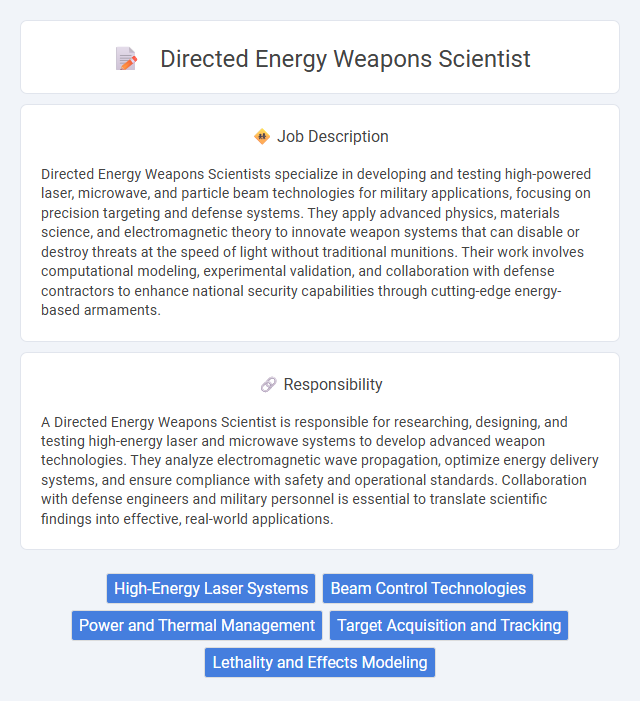
Directed Energy Weapons Scientists specialize in developing and testing high-powered laser, microwave, and particle beam technologies for military applications, focusing on precision targeting and defense systems. They apply advanced physics, materials science, and electromagnetic theory to innovate weapon systems that can disable or destroy threats at the speed of light without traditional munitions. Their work involves computational modeling, experimental validation, and collaboration with defense contractors to enhance national security capabilities through cutting-edge energy-based armaments.
Individuals with strong backgrounds in physics, engineering, and materials science are likely well-suited for a Directed Energy Weapons Scientist role, given the technical complexity involved. Candidates with excellent problem-solving skills and the ability to work under high-pressure research environments may find the job aligns with their capabilities. Those lacking in advanced scientific knowledge or discomfort with rigorous experimental protocols might face challenges adapting to this specialized field.
Qualification
Directed Energy Weapons Scientists require advanced degrees in physics, electrical engineering, or related fields, emphasizing expertise in laser technology, electromagnetics, and optical systems. Proficiency in computational modeling, materials science, and experimental prototype development is critical for innovation in high-energy laser and microwave weapon systems. Experience with defense research programs and familiarity with military-grade safety standards and software tools like MATLAB and CAD significantly enhance candidate qualifications.
Responsibility
A Directed Energy Weapons Scientist is responsible for researching, designing, and testing high-energy laser and microwave systems to develop advanced weapon technologies. They analyze electromagnetic wave propagation, optimize energy delivery systems, and ensure compliance with safety and operational standards. Collaboration with defense engineers and military personnel is essential to translate scientific findings into effective, real-world applications.
Benefit
A Directed Energy Weapons Scientist likely benefits from working at the forefront of cutting-edge technology, contributing to advancements in defense systems that enhance national security. The role probably offers opportunities for collaboration with multidisciplinary teams and access to state-of-the-art research facilities. Career growth and recognition in a highly specialized and impactful field may also be expected.
Challenge
A Directed Energy Weapons Scientist likely faces complex challenges in developing advanced technologies capable of precisely delivering energy to targets at great distances. The role probably involves overcoming significant technical hurdles related to energy generation, beam control, and atmospheric interference. Managing these difficulties may require innovative problem-solving skills and a deep understanding of physics and engineering principles.
Career Advancement
Directed Energy Weapons Scientists specialize in developing advanced laser, microwave, and particle beam technologies for military applications, driving innovation in precision targeting and defense systems. Career advancement often involves progressing from research roles to leadership positions, such as principal scientist or program manager, where strategic development and oversight of large-scale projects are key responsibilities. With experience, professionals can transition into defense consulting or executive roles within defense contractors, contributing to policy and technological advancements in national security.
Key Terms
High-Energy Laser Systems
Directed Energy Weapons Scientists specializing in High-Energy Laser Systems develop advanced laser technologies for military applications, focusing on precision targeting, beam propagation, and thermal management. They conduct research on laser-matter interactions and optimize optical components to enhance system efficiency and power output. Expertise in photonics, electromagnetic theory, and materials science is essential to innovate and improve directed energy weapon capabilities.
Beam Control Technologies
Directed Energy Weapons Scientists specializing in Beam Control Technologies develop advanced systems to precisely manipulate laser and microwave beams for military applications. They leverage expertise in adaptive optics, real-time atmospheric compensation, and high-energy beam propagation to enhance target accuracy and weapon effectiveness. Proficiency in photonics, signal processing, and computational modeling drives innovations that improve beam stability and minimize energy dispersion in directed energy weapon systems.
Power and Thermal Management
Directed Energy Weapons Scientists specializing in Power and Thermal Management develop advanced systems to optimize energy efficiency and heat dissipation in high-energy laser and microwave weapon platforms. Their expertise ensures sustained weapon performance by designing robust cooling systems and managing electrical power distribution under extreme operational conditions. Proficiency in thermodynamics, electromagnetic theory, and materials science is critical for innovating solutions that enhance system reliability and combat readiness.
Target Acquisition and Tracking
Directed Energy Weapons Scientists specializing in target acquisition and tracking develop advanced sensor systems and algorithms to precisely identify, lock onto, and monitor moving targets in real-time. Their expertise includes leveraging radar, lidar, and electro-optical technologies combined with machine learning techniques to enhance target discrimination and reduce false alarms. Collaboration with defense engineers ensures integration of tracking systems with directed energy platforms for optimized engagement accuracy and response time.
Lethality and Effects Modeling
A Directed Energy Weapons Scientist specializing in lethality and effects modeling develops advanced simulations to predict the impact of laser, microwave, and particle beam weapons on various targets. Expertise in physical interactions, damage mechanisms, and material response under high-energy exposure ensures accurate assessment of weapon performance and battlefield effectiveness. This role involves integrating physics-based models with empirical data to optimize weapon design and enhance target disruption capabilities.
 kuljobs.com
kuljobs.com